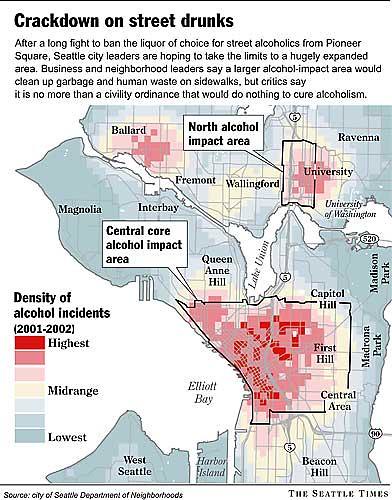The sales of alcoholic beverages in cities (DC vs. Chicago)
When I was an involved neighborhood activist, one of the H Street issues I got dragged into was the sales of packaged alcoholic beverages (package sales, Class A and B licenses), in particular the negative behaviors associated with the consumption of these products in the public space, and the overconcentration of stores selling such items in distressed neighborhoods, like how H Street was at that time. E.g., there were more Class A and B licenses selling alcohol in the H Street neighborhood than there were in Georgetown.
See in the 1980s, as an "economic development" strategy, under one of the Barry Administrations, the ability to sell alcoholic beverage was significantly expanded. And as this decision coincided with continued population outmigration and the development, distribution, and sales of crack, it was one of the contributors to problems in neighborhoods and commercial districts across the city, as more liquor stores became sites for loitering and other problems.
The problem is that alcohol consumption can be problematic and contributes to a number of social problems. My basic thing is that I don't care if people drink, I just don't want to have to deal with people drinking and carrying on in the public space.
In 2001, then Councilman Adrian Fenty first came to fame because he proposed a ban on the sales of "singles" in Ward 4. Eventually, the law was passed and it led to similar efforts in other neighborhoods.
I testified on that and other legislative initiatives back in the day (as a "prop" for one of my testimonies, I wanted to bring in a box of empties that I had picked up within one block of my house, over 100 bottles and cans, but they wouldn't let me bring the box into City Hall out of fear that the bottles could be used as projectiles).
I introduced the writer (Craig Timberg) to some research showing the connection between sales and problems, and he trumped me by finding (and introducing me to) better research on the topic, which is how I came to be aware of the work by Professor Dennis Gorman and others on the links between store locations, sales, and problems in particular neighborhoods over the sales of alcoholic beverages.
So it's interesting that for "revenue purposes," DC's Mayor Gray has proposed extending the sales of by the drink alcoholic beverages in restaurants, bars, and taverns by an hour or two each night, and allowing the package sales of beer, wine, and alcohol on Sundays. See "DC bar and nightclub owners back Gray plan to extend hours for alcohol sales" and "Sunday liquor sales in DC at last" from the Washington Post.
Interestingly, almost simultaneously, in Chicago, Mayor Emanuel is calling for the restriction of alcoholic beverage sales by "problem stores." See "Mayor says problem liquor stores a ‘cancer,’ proposes crackdown" from the Chicago Sun-Times.
From the CST article:
With Chicago’s murder rate up 60 percent over last year, Mayor Rahm Emanuel on Wednesday launched a coordinated crackdown aimed at shutting down liquor and convenience stores that serve as magnets for crime.
So I guess DC and Chicago are at different places revitalization-wise these days.
Selling alcoholic beverages on Sundays isn't necessarily a bad thing, especially as the closure of stores on Sunday is a vestige of religious practices shaping government regulation, which technically is a violation of the First Amendment.
There's a quote by me in the 2003 article about how Sundays, when alcohol sales are forbidden, were truly a "day of rest" on H Street in terms of loitering and other problems.
Relatedly, with hours extensions for selling of alcoholic beverages in restaurants, bars, and taverns, a similar kind of mapping of the city's establishments should occur so that locations that are truly neighborhood serving (say like Takoma Park) would have to go through an additional "special exception" type approval process (combined with regular reviews) before being allowed to extend their sales hours.
Some neighborhoods aren't able to handle the additional business and negative externalities that can come from such sales. (Also see "Riots claimed 200 liquor stores, but South L.A. still suffers" from the Los Angeles Times.)
Labels: alcohol sales, commercial district revitalization planning, neighborhood planning, professional licensing, public finance and spending, public health




0 Comments:
Post a Comment
<< Home